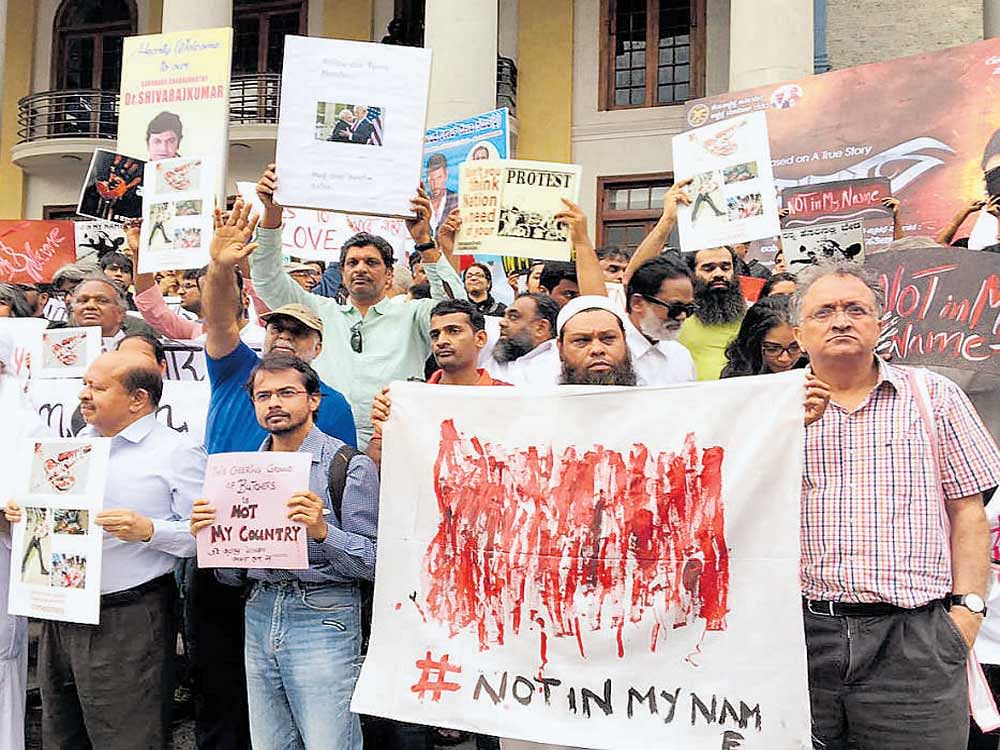Mewat region, constituting Alwar and Bharatpur districts in Rajasthan, and parts of Haryana, has transformed into a major battleground between the cow vigilantes and cattle traders.
This region, dominated by Muslims, has emerged as the epicentre of cow-related crimes and has become notorious in the recent past with people taking law into their hands, in the name of gau raksha. The place is infamous for cattle smuggling, but the bloody activism by cow protection groups and cow vigilantes has set a gory trend here.
According to locals, gau rakshaks patrol the roads at night and waylay bovine transporters, mostly smugglers from the Muslim-dominated Meo region, who take cattle into the neighbouring Haryana. These mobs also reportedly extort money from cattle transporters. Moreover, when the confrontations turn bloodier, the attack is given a religious hue.
The crisis escalated with the death of Pehlu Khan, in April last year, and Umar Mohammad, in November. Akbar Khan, who died two months ago, is the latest victim of mobocracy. All the attacks and killings have happened in the same region.
“Whenever we transport a cow, we are being stopped by them (vigilantes) and they extort money. If we don’t give, they threaten to lodge a case against us and sometimes they also replace the milch cows with a kattu cow (forsaken cattle). In front of the police, they prove that we were smuggling cows for slaughter. Police register a case and challan is made against us,” Mohammad Ayub, a dairy farmer at Nuh said.
Nawal Kishore Sharma, chief of Vishva Hindu Parishad’s local Gau Raksha cell, explains the other side, “We have trained our people how to detect cattle smugglers. The smugglers are mostly identified by the vehicle they use. This vehicle has a bumper in the front and lacks the number plate at the back. Once we spot such vehicles, we stop them and ask for the papers and receipts. We inform the police if they fail to show the documents.”
Throwing light on the ugly confrontations between the two parties, Kavita Srivastava, president of People’s Union for Civil Liberties Rajasthan, said, “The extortionists indulge in violence under the garb of gau rakshaks. If the cattle transporters are unable to pay them, they are brutally attacked with weapons or shot.”
A series of such ugly confrontations has not only caught the attention of national media but has also tarnished the image of Rajasthan, some even calling it ‘Lynchistan’.
Rajasthan Chief Minister Vasundhara Raje told DH, “A crime is a crime, be it smuggling of cattle or violence. Labels such as these are created by those who are disconnected from the people. It has to be understood that such acts are a manifestation of angst created out of lack of access to opportunities and resources. This is exactly what we are trying to rectify through widespread skill development and creating opportunities for gainful employment — within the government, in the private sector, and self-employment.”
According to the police, those involved are either uneducated or unemployed. “It is a well-known fact that smuggling takes place in that area. There is an industry thriving on the smuggling of cows. Its skin, meat and bones are sold in other states. When we intercept the vehicles we realise that they are usually stolen cars,” state’s Additional Director General of Police (Crime) Pankaj Singh said.
Rajasthan police are taking preventive actions to curb such activities. “Police are identifying the gangs who are into the smuggling of cows and group of people involved in vigilantism. As a preventive measure, we are bounding them into IPC sections 116 and 107. As a part of the preventive measure, we have also started counselling such people. Especially in Al- war and Bharatpur, police are also working on old cases and the guilty are charge-sheeted,” Special Director General of Police (Law and Order) NRK Reddy said.
Criminals as heroes
Rajasthan is the only state in the country that has a cow welfare department. Cow slaughter is punishable by up to 10 years in jail. Social experts are of the opinion that communal polarisation and lack of awareness are responsible for a charged atmosphere in Mewat. “The violent attacks on people, mostly Muslims, in the name gau raksha continue because the culprits are rewarded by the BJP and its government. BJP MLAs and leaders felicitate the lynchers or even refer to them as Bhagat Singh! For the BJP, such attacks help use anti-Muslim feelings to cement the Hindu vote bank. They also help divert people’s attention away from important issues such as unemployment, farmers rights, women’s rights, price rise and corruption,” noted social activist Kavita Krishnan said.
Senior advocate and activist Prashant Bhushan opined that such crimes have risen with the ascent of the BJP government at the Centre and in the state. “It is evident from repetitive lynching attacks that mobs have protection from the state government. To ensure a fair trial, such cases should be shifted to CBI or any outside agency,” he said.
As per the instructions of Supreme Court, Rajasthan government has appointed a nodal officer to curb cow vigilantism. The Supreme Court recently ordered the Principal Secretary (Home) of Rajasthan to respond and clarify the Vasundhara Raje government’s position and dealing with “every aspect” of the action taken against the officials in the aftermath of the brutal lynching of Akbar Khan and his subsequent death.
A contempt petition has been filed in Supreme Court by activists Tushar Gandhi and Tehseen Poonawala seeking action against the Rajasthan government for its failure to check lynchings.
